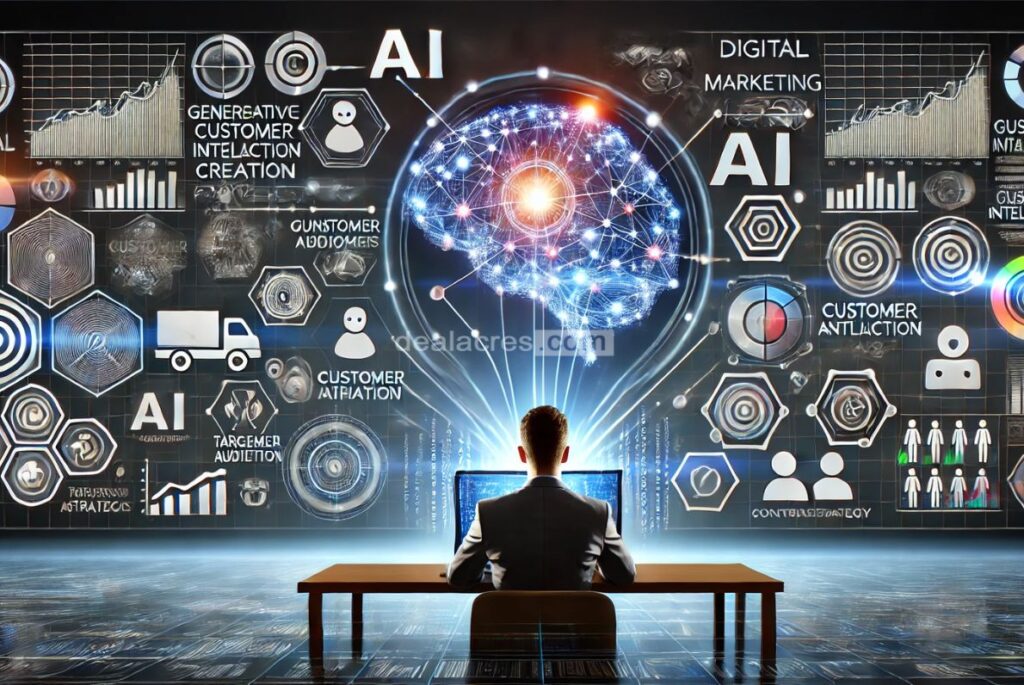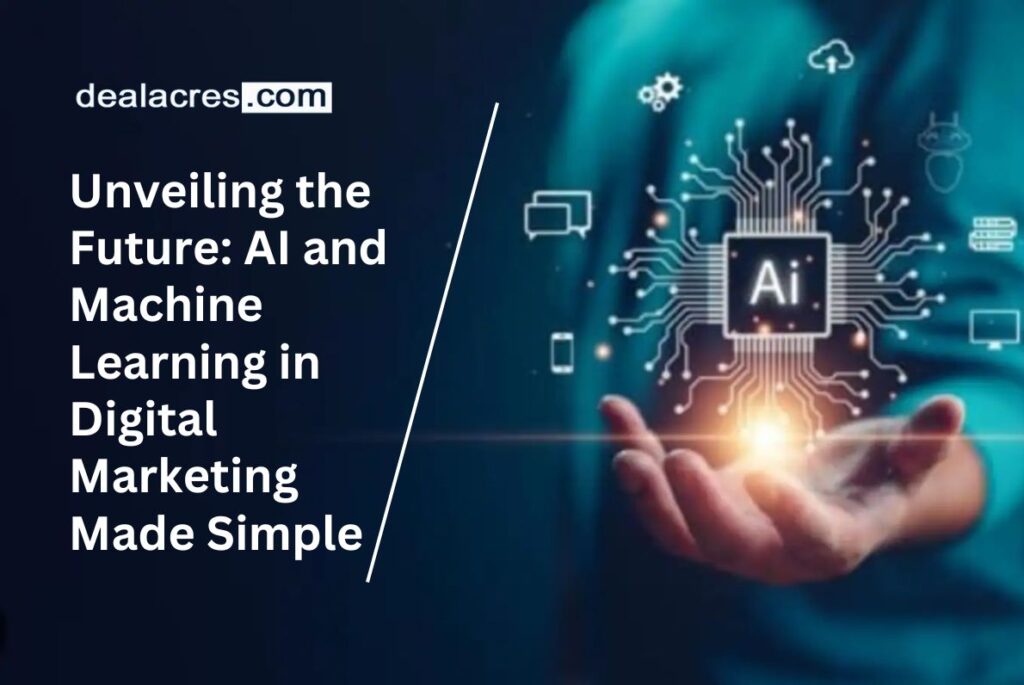Introduction:
In the ever-evolving landscape of digital marketing, two powerful forces—Artificial Intelligence (AI) and Machine Learning (ML)—are reshaping the way businesses connect with their audience. But fear not, as we embark on this journey into the realm of bits and algorithms, we’ll break down the complexities and explore how AI and ML are transforming digital marketing in simple language.

Understanding AI and Machine Learning:
Demystifying Artificial Intelligence (AI):
At its core, AI refers to the development of computer systems that can perform tasks that typically require human intelligence. These tasks include learning, problem-solving, language understanding, and even visual perception. AI systems can analyze data, draw insights, and make decisions without explicit programming.
Unlocking the Magic of Machine Learning (ML):
Machine Learning is a subset of AI that focuses on creating systems that can learn from data. Instead of relying on explicit programming, ML algorithms use patterns and experiences to improve their performance over time. It’s like teaching a computer to recognize patterns and make predictions on its own.
The Role of AI and Machine Learning in Digital Marketing:
Enhanced Customer Insights:
AI and ML empower digital marketers with advanced tools to gather and analyze vast amounts of customer data. These technologies can identify patterns in customer behavior, preferences, and interactions, providing valuable insights to tailor marketing strategies.
Predictive Analytics for Personalization:
Predictive analytics, driven by machine learning, allows marketers to predict future trends and customer behaviors. This capability enables personalized content recommendations, product suggestions, and even the timing of marketing campaigns based on individual preferences.
Chatbots for Real-time Engagement:
AI-powered chatbots have revolutionized customer interactions. These bots use natural language processing to understand and respond to user queries in real time. They enhance customer support, answer inquiries, and guide users through the buyer’s journey, providing a seamless and responsive experience.
Dynamic Pricing Optimization:
Machine learning algorithms can analyze market trends, competitor pricing, and customer behavior to optimize pricing strategies dynamically. This allows businesses to adjust prices in real time, ensuring competitiveness and maximizing revenue.
Behavioral Targeting and Retargeting:
AI and ML enable behavioral targeting, where ads are shown to users based on their online behavior and interests. Additionally, retargeting campaigns use machine learning algorithms to identify users who have shown interest in a product but haven’t made a purchase, delivering tailored ads to encourage conversion.
Email Marketing Automation:
AI-driven email marketing automation takes personalization to the next level. These systems analyze user behavior, segment audiences, and send targeted and personalized emails based on individual preferences, increasing engagement and conversion rates.
Content Creation and Curation:
AI can assist in content creation by generating headlines, writing product descriptions, and even composing articles. Machine learning algorithms analyze trending topics and user engagement data to curate content that is likely to resonate with the target audience.
Image and Video Recognition:
Visual content plays a significant role in digital marketing. AI algorithms can analyze images and videos to recognize objects, scenes, and even emotions. This capability is leveraged for targeted advertising, content optimization, and user engagement.
SEO and Content Optimization:
AI tools enhance search engine optimization (SEO) efforts by analyzing search patterns and user behavior. Machine learning algorithms can recommend keyword strategies, identify content gaps, and optimize website content for improved search engine rankings.
Fraud Detection and Security:
AI and ML contribute to the security of digital marketing platforms by detecting and preventing fraudulent activities. These technologies analyze patterns in user behavior to identify anomalies, protecting businesses from malicious activities such as click fraud or account breaches.
Social Media Insights and Automation:
AI-powered tools analyze social media data to provide insights into audience behavior, sentiment, and engagement. Automation in social media management allows marketers to schedule posts, analyze performance, and even respond to comments more efficiently.
Customer Journey Mapping:
Machine learning algorithms assist in mapping the customer journey by analyzing touchpoints and interactions across various channels. This helps marketers understand the path customers take from awareness to conversion, enabling the optimization of marketing strategies at each stage.

Implementation of AI and Machine Learning in Digital Marketing:
Customer Segmentation:
AI and ML enable more accurate customer segmentation by analyzing a wide range of data points. Marketers can create highly targeted campaigns for specific segments, ensuring that content is relevant and resonates with the intended audience.
A/B Testing and Optimization:
A/B testing involves comparing two versions of a webpage, email, or ad to determine which performs better. Machine learning algorithms can automate the A/B testing process, analyze results in real time, and optimize campaigns based on performance data.
Natural Language Processing (NLP) in Content Creation:
Natural Language Processing, a subset of AI, enhances content creation by understanding and generating human-like language. AI tools utilizing NLP can assist in crafting compelling and relevant content that aligns with the tone and preferences of the target audience.
Dynamic Content Personalization:
AI-driven dynamic content personalization tailors website content, emails, and advertisements based on user behavior and preferences. This ensures that each user receives a personalized experience, increasing engagement and conversion rates.
Voice Search Optimization:
With the rise of voice-activated devices, AI is crucial for optimizing content for voice search. Machine learning algorithms analyze voice search patterns to help businesses adapt their SEO strategies for voice-enabled search queries.
Sentiment Analysis in Social Media:
Sentiment analysis, powered by AI, allows businesses to understand the sentiment behind social media mentions. Analyzing whether mentions are positive, negative, or neutral helps businesses gauge public perception and respond accordingly.
Lead Scoring and Qualification:
AI and ML automate the lead scoring process by analyzing data on leads’ interactions and behaviors. This allows marketers to prioritize leads based on their likelihood to convert, enabling more efficient and targeted follow-up strategies.
Recommendation Engines:
Recommendation engines, driven by machine learning, analyze user behavior to suggest products or content that align with individual preferences. This is prominently seen in e-commerce platforms, streaming services, and content recommendation widgets.
Challenges and Considerations:
Data Privacy and Security:
The use of AI and ML involves handling vast amounts of data. It is crucial for businesses to prioritize data privacy and implement robust security measures to protect customer information from unauthorized access or breaches.
Ethical Considerations:
AI systems are only as unbiased as the data they are trained on. Businesses must be vigilant in addressing ethical concerns related to bias in algorithms, ensuring fairness and avoiding discriminatory practices.
Continuous Learning and Adaptation:
AI and ML models require continuous learning and adaptation. It’s essential to regularly update algorithms, train models with fresh data, and stay abreast of advancements in the field to ensure optimal performance.
Integration Challenges:
Integrating AI and ML into existing marketing systems can be challenging. Businesses need to carefully plan the integration process, ensuring compatibility with existing technologies and providing adequate training for the marketing team.
Balancing Automation and Human Touch:
While automation is powerful, maintaining a human touch is crucial in marketing. Striking the right balance between automated processes and genuine human interactions ensures that marketing efforts remain authentic and customer-centric.

Real-Life Examples of AI and Machine Learning in Digital Marketing:
Netflix:
Netflix utilizes machine learning algorithms to analyze user viewing history and behavior. The recommendation engine suggests personalized content based on individual preferences, keeping users engaged and increasing the likelihood of continued subscriptions.
Amazon:
Amazon’s use of AI is evident in its recommendation system. The platform analyzes past purchases, searches, and browsing history to suggest products that align with individual customer preferences, creating a personalized shopping experience.
Spotify:
Spotify employs machine learning to curate personalized playlists for users. The platform analyzes listening habits, genre preferences, and user-created playlists to generate Discover Weekly and Release Radar playlists tailored to individual tastes.
Google Search:
Google’s search algorithms leverage machine learning to deliver more relevant search results. RankBrain, a machine learning system, helps understand the intent behind search queries and provides results that match user expectations more accurately.
Chatbots in Customer Support:
Numerous businesses use AI-powered chatbots for customer support. These bots, equipped with natural language processing, can understand and respond to customer inquiries, providing instant assistance and improving overall customer satisfaction.
Conclusion:
In the ever-evolving landscape of digital marketing, the integration of Artificial Intelligence and Machine Learning is more than a trend—it’s a transformative force. From enhancing customer insights and personalizing content to automating complex tasks and optimizing strategies, AI and ML are empowering marketers to reach new heights of efficiency and effectiveness.
While the terminology might sound complex, the essence is clear: AI and ML are tools that simplify and amplify the impact of digital marketing efforts. By understanding customer behavior, predicting trends, and delivering personalized experiences, businesses can build stronger connections with their audience and stay ahead in the dynamic world of digital marketing.
So, fear not the algorithms and data points, for they are the allies that propel your marketing efforts into the future. Embrace the possibilities, stay curious, and let the magic of AI and ML unfold as you navigate the exciting landscape of digital marketing.




